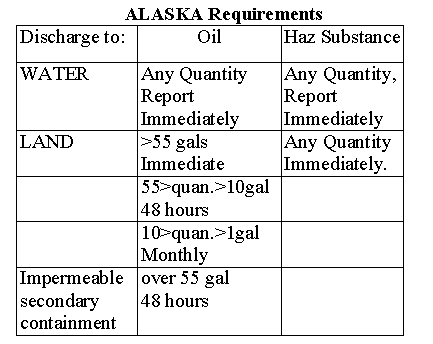
Module 13, continued
Oil Issues
Because oil (hydrocarbons) products are flammable, toxic, and omnipresent, we
will briefly consider their regulatory treatment, especially the amount it takes
to require a notification to National Response Center. Petroleum, both crude
and fractions, are excluded from CERCLA. Also petroleum and oil products are
generally not wastes, so they do not come under RCRA. Until they are spilled,
they do not come under CWA. But:
Oil and CERCLA
The hazardous ingredients of oil, such as benzene, are reportable. So if there
is an oil spill that has more than the CERCLA RQ (reportable quantity) of some
oil ingredient, the spill would be reportable. The RQ for benzene is 10 pounds.
So if 100 pounds of crude oil spilled and it was 20% benzene, the spill would
have to be reported to the National Response Center.
Oil and RCRA
Since the oil is not a waste, it does not come under RCRA. A few oil wastes,
such as used motor oil, do come under RCRA. Let's say we clean up a fuel contaminated
site and now have a truckload of soil. If the waste had RCRA characteristics
of igniteability, the soil is a RCRA waste, likewise if it had the RCRA characteristic
of toxicity, for any of the fuel constituents, it would likewise be a RCRA waste.
A certain RCRA issue is a spill by a generator or TSD facility.
Oil and the CWA
For storage of oil and products, the CWA calls for a SPCC (Spill Prevention,
Control, and Countermeasures Plan). This will usually call for dikes and such
for all oil storage. Once oil is spilled, the question is if the amount “may
be harmful,” or produce a sheen, sludge, etc. Details of the SPCC requirement
are found at 40 CFR 112.1. The plan must be sealed by a PE.
Oil and UST (Underground Storage Tanks)
All UST spills (leaks) are reportable.
Oil and EPCRA
(Emergency Planning and Community Right-to-Know) Spiller must notify LEPC, Local
Emergency Planning Council, and SERC, State Emergency Response Commission, of
all CERCLA Reportable spills.
ALASKA Requirements

So, in Alaska, if you spill 9 gallons of oil to the land, you have up to one
month to report it. If you spill any amount to water, you have to report it
immediately.